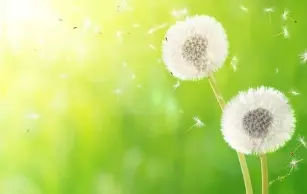
The end of winter means a season of problems for people with allergies. Until September we will be dealing with plant pollination. In order to effectively avoid embarrassing and burdensome symptoms of allergy, it is good to know when which plant has its pollen season. Helpful and necessary in this is the so-called Pollen calendar. It was developed with allergy sufferers in mind. Thanks to it, you can check in which month and in which region of Poland there is a concentration of allergens of plant origin, associated with the flowering of plants. This information is necessary for people struggling with inhalant allergies due to the possibility of earlier prevention.
The first months of the year, such as January and February, are usually not associated with pollination of plants. However, this is the pollen season mainly for hazel, yew and alder. There are no leaves on the trees in these months, so allergens are freely carried by the wind. The first symptoms of allergies, such as rhinitis, are mistaken for a cold. They intensify on sunny and sunny days while being outdoors. They subside on rainy and snowy days.
In order to effectively fight allergies, it is worth getting ready for the end of pollen. Here are some ways to best deal with its symptoms.
— first of all, you should always have a pollen calendar at hand – it is always worth using the current ones, which are created on the basis of analyzes carried out on last year’s conditions. Current calendars are often published in newspapers, health guides, on the Internet or on the radio
— avoid leaving the house during the rain – we inhale the largest amount of pollen during the first few minutes of rain, when they are flushed to the ground; then it is worth closing the windows in the house so that they do not get into the closed room
— a walk a few minutes after rain, in the late afternoon or evening – the air is the cleanest right after the rain. Lower concentrations of pollen in the air can also be observed late in the day. It is worth using them to ventilate and get some fresh air
— let’s spend the period of the greatest dusting at home – don’t plan trips to the open air for the weekend. Avoid meadows, parks and large clusters of deciduous trees. If you want to go on a trip, choose conifers. They do not sensitize and additionally clear the upper respiratory tract thanks to the resin oils in the air.
— it is worth choosing the mountains or the sea for your vacation. In the mountains, due to the high altitude, the concentration of pollen is much lower than in the valleys and valleys. By the sea, pollen is dispersed by the wind blowing from the water.
— lawns are best mowed before the grass blooms. Its flowering period can be easily checked in the pollen calendars.
— during the pollen season, physical activity in the open air should be avoided
— at home, it is worth hanging thick curtains or special nets on the windows that will limit the entry of pollen into the house.
By following a few of the above tips, it will be much easier to avoid ailments related to pollen allergy. We certainly cannot rule them out completely, but they can be effectively reduced. At the same time, it is worth remembering about the possibility of using additional antihistamines, which will help us choose an allergist.









